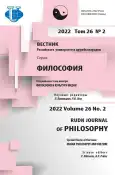Inclusivism, Perspectivism and Pluralistic Tendencies in the History of Indian Culture
- Authors: Desnitskaya E.A.1
-
Affiliations:
- Institute of Oriental Manuscripts RAS
- Issue: Vol 26, No 2 (2022): INDIAN PHILOSOPHY AND CULTURE
- Pages: 342-352
- Section: INDIAN PHILOSOPHY AND CULTURE
- URL: https://journal-vniispk.ru/2313-2302/article/view/325327
- DOI: https://doi.org/10.22363/2313-2302-2022-26-2-342-352
- ID: 325327
Cite item
Full Text
Abstract
This article provides a survey of approaches and conceptual means elaborated in recent decades in the studies of pluralistic tendencies in Indian culture. The concepts of inclusivism, perspectivism, antologizing and polyphony are discussed in a close relation with the specific context in which they were introduced, as well as with the implicit presuppositions of the scholars who elaborated them. In particular, the interpretations of inclusivism introduced by Paul Hacker and Gerhard Oberhammer were inextricably intertwined with the views on Indian religions these scholars developed. The concept of perspectivism was introduced in a philosophical context, mainly with respect to Bhartṛhari’s and Jaina philosophy. Antologizing and polyphony can be characterized as a more cautious way to conceptualize pluralistic tendencies in Indian traditional discourse, because they focus on narrative strategies that enable expressing alternative views in the frames of a single text. From a historical point of view pluralistic tendencies might be stipulated by the diverse social reality in Ancient India where heterogeneous cultural phenomena coexisted in a process of mutual reinterpretation and adaptation. Another possible presupposition of perspectivism could be the cyclic concept of time that was predominant in Indian traditional discourse. In Indian intellectual systems pluralistic practices were usually legitimized with the view that there are different levels of truth. Though instances of inclusivism can be discovered in the cultures of different regions, it was in India that inclusivism became a dominant trend in the cultural history.
About the authors
Evgeniya A. Desnitskaya
Institute of Oriental Manuscripts RAS
Author for correspondence.
Email: khecari@yandex.ru
ORCID iD: 0000-0001-7890-2061
CSc in Philosophy, Researcher at the Institute of Oriental Manuscripts
18, Dvortsovaya emb., St. Petersburg, 191186, Russian FederationReferences
- Dodson MS. Re-Presented for the Pandits: James Ballantyne, ‘Useful Knowledge’, and Sanskrit Scholarship in Benares College during the Mid-Nineteenth Century. Modern Asian Studies. 2002;36(2):257—298.
- Hacker P. Religiöse Toleranz und Intoleranz im Hinduismus. Saeculum. 1957;(8): 167—179. (In German).
- Hacker P. Inklusivismus. In: Oberhammer G., editor. Inklusivismus: eine Indische Denkform. Wien: de Nobili; 1983. Р. 11—28. (In German).
- Hacker P. Philology and Confrontation. New York: SUNY; 1995.
- Desnitskaya EA. Inclusivism as a Сonceptual Means in the Works by Paul Hacker and Gerhard Oberhammer. Voprosy filosofii. 2021;(7):191—200. (In Russian).
- Lapshin IY. Inclusivism of P. Hacker: The Reception of G. Oberhammer. Voprosy filosofii. 2021;(7):201—205. (In Russian).
- Pskhu R. Methodological Consequence of Application of Gerhard Oberhammer’s Religious Hermeneutics to the Study of Indian Philosophy. Advances in Social Science, Education and Humanities Research. 2019;(329):203—206.
- Oberhammer G. Der Inklusivismus-Begriff P. Hackers. Versuch eines Nachwortes. In: Oberhammer G, editor. Inklusivismus: eine Indische Denkform. Wien: de Nobili; 1983. Р. 93—113. (In German).
- Halbfass W. “Inklusivismus” und “Toleranz” im Kontext der Indo-europäischen Begegnung. In: Oberhammer G, editor. Inklusivismus: eine Indische Denkform. Wien: de Nobili; 1983. Р. 29—60. (In German).
- Halbfass W. India and Europe: An Essay in Philosophical Understanding. New York: SUNY; 1988.
- Wezler A. Bemerkungen zum Inklusivismus-Begriff Paul Hackers. In: Oberhammer G., editor. Inklusivismus: eine Indische Denkform. Wien: de Nobili; 1983. Р. 61—92. (In German).
- Desnitskaya EA. Perspectivism as a Philosophical Strategy in Bhartṛhari’s ‘Vākyapadīya’. RUDN Journal of Philosophy. 2017; 21(1):33—41. https://doi.org/10.22363/2313-2302-2017-21-1-33-41 (In Russian).
- Trikha H. Competing World Views: Perspectivism and Polemics in the Satya-śāsana-parīkṣā and Other Jaina Works. Journal of Indian Philosophy. 2012;(40):25—45. https://doi.org/10.1007/s10781-011-9147-y
- Cardona G. Approaching the Vakyapadiya. The Journal of the American Oriental Society. 1999;119(1):88—125.
- Olivelle P. Inklusivismus: Eine Indische Denkform by Gerhard Oberhammer. Journal of the American Oriental Society. 1986;106(4):867—868.
- Olivelle P. Manu's code of law. Oxford: Oxford University Press; 2005.
- Nicholson AJ. Doxography and Boundary-Formation in Late Medieval India. World View and Theory in Indian Philosophy. Delhi: Manohar; 2012. Р. 103—118.
- Bakhtin MM. Problems of Dostoevskiy's Poetics. Moscow: Languages of Slavic Culture; 2002. (In Russian).
- Vasilkov YaV. 'Mahābhārata', the Ancient Indian Epics: A Study in History and Typology. Authorized Summary of the Doctoral Thesis. Saint Petersburg; 2003. (In Russian).
- Desnitskaya E. Nonagonistic Discourse in the Early History of Indian Philosophical Debates: From Brahmodyas to the Mahābhāṣya. In: Framing Intellectual and Lived Spaces in Early South Asia: Sources and Boundaries. Berlin: de Gruyter; 2020. Р. 145—171. https://doi.org/10.1515/9783110557176-006
- Witzel M. The development of the Vedic canon and its schools: The social and political milieu. In: Inside the Texts, Beyond the Texts: New approaches to the study of the Vedas. Cambridge: Harvard University; 1997. p. 257—345.
- Al-Biruni. India. Moscow: Ladomir; 1995. (In Russian)
- Ham HS. Inclusivism: the Enduring Vedic Vision in the Ever-Renewing Cosmos. Critical Review for Buddhist Studies. 2013;(6):9—53.
Supplementary files









